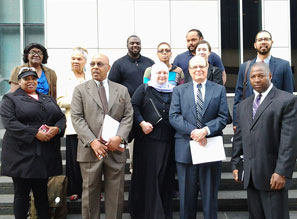(CLEVELAND, OH, 6/29/15) – The Cleveland branch of the National Association for the Advancement of Colored People (NAACP), the Collaborative for a Safe, Fair and Just Cleveland, and the Cleveland Chapter of the National Lawyers Guild announced the filing of an Amicus Brief today in US Federal District Court in the matter of United States v. City of Cleveland (1:15-cv-01046). CAIR-Cleveland is a founding member of the Collaborative for a Safe, Fair and Just Cleveland.
In the brief filed today, the civil rights groups are seeking to address concerns about the Settlement Agreement reached between the City of Cleveland and the U.S. Department of Justice (DOJ) regarding the DOJ’s Finding on December 4, 2014. A nearly two-year long investigation by the DOJ revealed that the Cleveland Division of Police had engaged in a pattern and practice of unconstitutional conduct, including excessive use of force in violation of the Fourth Amendment.
- See: Cleveland’s consent decree has deficiencies that will hinder reform, court filing says
- Groups seek changes to Cleveland police consent decree
The Amicus Brief outlined the following issues that must be addressed to ensure the consent decree will provide a solid roadmap for successful reforms:
- The office of the inspector general should be completely independent and should not report to the police chief, whose policies he/she would be obligated to critique.
- The Division of Police should not be permitted to police themselves regarding the most serious uses of force that result in homicide or serious bodily harm. These incidents should be referred to an independent investigator.
- To ensure bias-free policing the collection of critical demographic data is essential. As it stands, such data is not collected during the citizen’s complaint process or on the use of force reporting forms.
- Specific provisions regulating police engagement with youth must be included.
- The Community Police Commission must be strengthened.
- The stipulation that bestows on the Monitor blanket testimonial immunity is not in the best interest of the community, and must be abridged.
– END –
CONTACT: James Hardiman, NAACP, 216.256.6544, E-Mail, attyjhard@aol.com; Julia A. Shearson, Executive Director, Council on American-Islamic Relations, Cleveland Chapter, 216.830.2247, E-Mail, jshearson@cair.com

